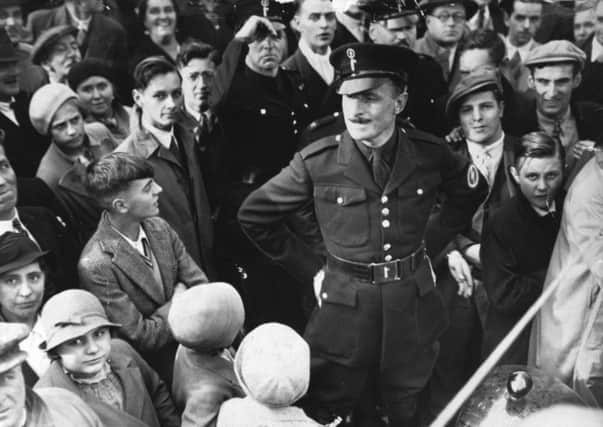New books shed light on fascists and '˜Nazi sympathisers' during Second World War


Few stories have been told about the British men and women who were prepared to betray their country during the Second World War.
But two books, published this week, will shed light on those willing to risk the noose to help Nazi Germany.
Advertisement
Hide AdAdvertisement
Hide AdAuthors Tim Tate, also an investigative journalist and documentary film-maker, and Robert Hutton, the British political reporter for Bloomberg News, have both delved into MI5 files in the National Archive and explored the history of war time fascists.


In Hitler’s British Traitors The Secret History of Spies, Saboteurs and Fifth Columnists, Tate uncovers the largely unknown story of more than 70 traitors convicted of working to help Nazi Germany win the war, and several hundred fascists who were interned without trial on evidence that they were working on behalf of the enemy.
Meanwhile, Hutton’s Agent Jack: The True Story of MI5’s Secret Nazi Hunter, centres around a seemingly ordinary bank clerk, working as a secret agent to identify apparently loyal British men and women who longed for a Nazi conquest.
Both contain a connection to Leeds.
Tate makes reference to John Ellis, a Yorkshire businessman, who he describes as an “influential figure” in the local British Union of Fascists (BUF). He had entertained Mosley (Sir Oswald, leader of the BUF, which later became known as the British Union) over luncheons and suppers at his Horsforth home.


Advertisement
Hide AdAdvertisement
Hide AdIn 1940, “West Riding Constabulary received a stream of complaints that Ellis was in the habit of pressing fascist literature on his employees and neighbours,” writes Tate, “and that visitors to the Ellis house observed him, his wife and their children giving the Nazis’ straight-armed salute and ending conversations with a hearty ‘Heil Hitler’”.
A case against him soon built up, with a series of discoveries in woodland in Cumbria including copies of Mosley’s book, a package of BUF pamphlets and literature and 360 rounds of ammunition.
“Some of the material bore a name and address: Mr and Mrs J. Ellis, The Rookery, Horsforth,” writes Tate.
What police found when they searched the house days later prompted an order to be signed for Ellis’ detention on June 25 that year; a stash of weapons - some of which were unlicensed and illegal, ammunition, BUF newspapers, Hitler’s Mein Kampf in both German and English and a collection of 205 maps marked with “strategically important towns, bays, harbours and ferries”. He was arrested and taken to prison in Liverpool.
Advertisement
Hide AdAdvertisement
Hide AdBut, Tate says, with the help of money to pay for legal representation and “political clout”, Ellis appealed against his internment, claiming he had joined the BUF several years earlier but was a ‘non-active’ member.
The maps, he said, included locations he wanted to show his children on motoring holidays, the weapons and ammunition, he explained, were due to his shooting hobby.
In September, Ellis was deemed a “truthful and reliable man” and paperwork was signed for his release.
“The decision was greeted with anger and disbelief,” writes Tate, with both MI5 and the Regional Commissioner raising concern.
Advertisement
Hide AdAdvertisement
Hide AdTate found Ellis’ file in the National Archives. “It shows that he was a die hard fascist,” he says. There is no evidence that he directly helped Nazis, Tate says, though “there was more than enough evidence against Ellis to keep him inside as a thorough danger”.
“There is a real arrogance about the man,” he says, referring to a notice he says was published in The Yorkshire Post ahead of Ellis’ arrest.
“He knows that he has been collecting things like sensitive maps, arms and ammunition and he puts this legal notice in The Yorkshire Post, threatening legal action against anyone who dares to say he isn’t a loyal citizen.
“Ten days later the evidence that he absolutely was not was seized in a raid on his house and in reports coming into the police. I think there is a certain arrogance to that.”
Advertisement
Hide AdAdvertisement
Hide AdEllis’ file was just one of many through which Tim, who worked at The Yorkshire Post in 1982, searched to write his book.
“The official history if you like of the Second World War says that the Fifth Column was largely a myth,” he says.
“That is simply not true. The cases I deal with [in the book] and the stories I tell is not the majority of the British population, but it is a significant small minority in that they were genuinely dangerous.”
Secret agent Eric Roberts, the focus of Hutton’s book, helped to identify disloyal men and women including those willing to assist the Nazis.
Advertisement
Hide AdAdvertisement
Hide AdAn operation believed to be Roberts’ first as an official member of MI5 took him to Leeds, Hutton explains, in August 1940, where it was believed a branch of the British Union was continuing to operate despite being outlawed by prime minister Winston Churchill.
“There’s this little group of people meeting in the back of a tobacconist shop on the north side of Leeds,” he says. “The British Union is a banned organisation but Reg Windsor, who runs this shop, wants to keep it going.”
“His little group discussed how Britain had been dragged into war against its natural ally by the Jews,” he writes, “and what they might do to restore common sense to the nation, which would clearly come only with a swift military defeat for the Churchill government.”
Shortly after an attempt by some members to start a fire at a Jewish shop in the hope of beating the blackout and guiding the Luftwaffe to Leeds, Roberts goes to see them, posing as a member of the BU and later, a German agent.
Advertisement
Hide AdAdvertisement
Hide Ad“He had this amazing ability to win people over,” says Hutton. “I think he was just really, really likeable. He liked people and people liked him and wanted him to like them.”
Another arson attack, this time on a warehouse, was planned and Roberts arranged for police to lie in wait and make arrests. But with officers waiting at the other side of the building, his trap failed.
“Even if they couldn’t be prosecuted, there was another option open to MI5,” Hutton writes.
“Under emergency wartime laws, the government had the power to lock people up, indefinitely and without trial, if they were suspected of being Nazi sympathisers.” In December 1940, four members of the group were arrested.
Advertisement
Hide AdAdvertisement
Hide Ad“They swiftly confessed their support for fascism and their attempts to sabotage the British war effort”, he writes, though they blamed Roberts for “leading them astray”.
The Home Office, Hutton says, had wanted criminal prosecution but MI5 feared a trial would mean Roberts having to give evidence, blowing his cover. It was something they were not prepared to risk.
Books out tomorrow
Tim Tate, who was born in Calcutta, India, has written 15 non-fiction books, made more than 80 documentary films for British and international networks, and has written for national and regional newspapers.
His book Hitler’s British Traitors The Secret History of Spies, Saboteurs and Fifth Columnists will be published on September 6 by Icon books.
Advertisement
Hide AdAdvertisement
Hide AdRobert Hutton, who lives in south east London, worked at the Mirror and Financial Times and helped set up Christians in Journalism in 2002, before joining Bloomberg in 2004.
His book Agent Jack: The True Story of MI5’s Secret Nazi Hunter will also be published tomorrow, September 6, by Weidenfeld & Nicolson.